Dome of the Rock
Photos by Nili Gross
Photos by Nili Gross
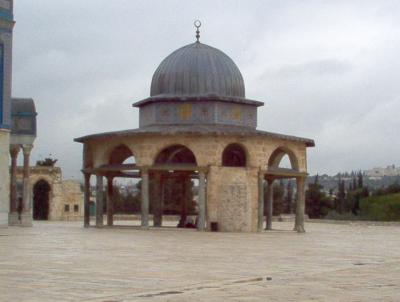
On the Temple Mount
Dome of the Rock
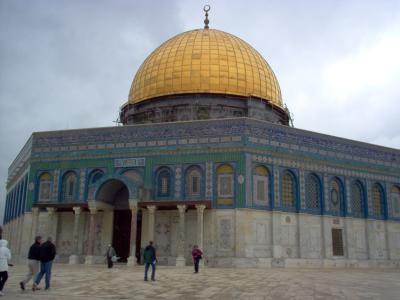
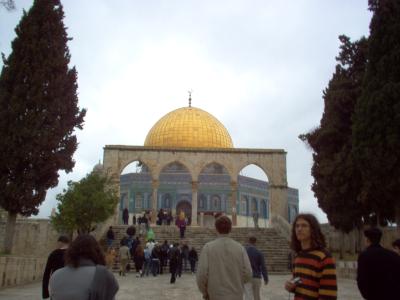
(0 Kommentare) ... comment
spring-love 3
Photo documentation by Lia Boehmer
Photo documentation by Lia Boehmer
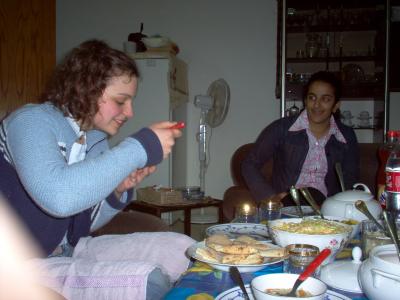
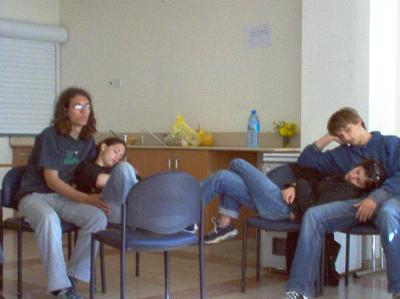
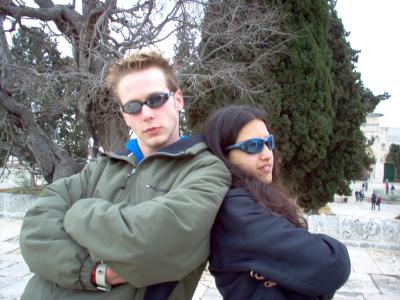
(0 Kommentare) ... comment
spring-love 2
Photos by Lia Boehmer
Photos by Lia Boehmer
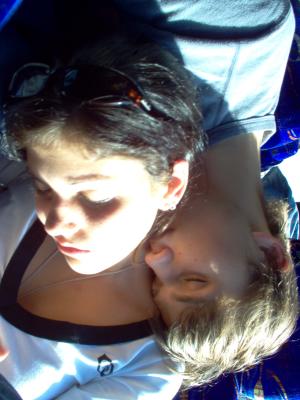
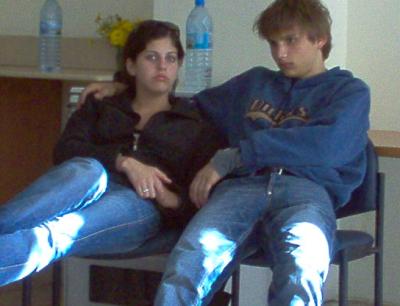
spring-love 1
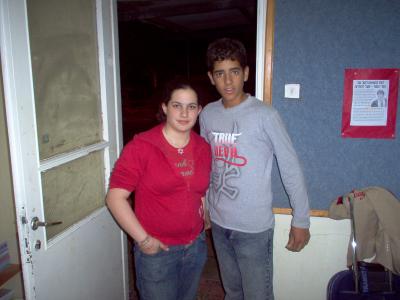
(0 Kommentare) ... comment
spring-friends

Lia and Shadi

Saul and Andi

Manu and Eilam

Dor and Sarah
Or and Andi
Andi and Or


Reem and Sarah

Saul and Mor, Andi and Or

Walter and Reut

(0 Kommentare) ... comment
sleeping in 1000-star-hotel Mamshit
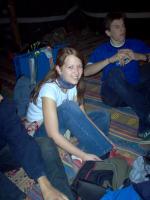
(0 Kommentare) ... comment
Spring-peacecamp 2005: identities unsolved?
Touring Israel together:
March 31st - April 7th, 2005
Evelyn Böhmer-Laufer
Touring Israel together:
March 31st - April 7th, 2005
Evelyn Böhmer-Laufer
A very special group of people boarded the El Al flight from Vienna to Tel Aviv on this early Thursday morning: 10 teenagers from the Carinthian Alpen-Adria-Gymnasium with their two teachers Elfriede Kopeinig and Heidi Jausovec. A warm welcome awaited them at Ben Gurion airport when they were picked up by 9 young Israeli Arabs from the Arab town Kalanswa and their 8 Jewish friends from the nearby Ramot Hefer high school in the Israeli Sharon area. They were accompanied by their Arab teachers Hosnia Matani and Otman Hatit and the Jewish-Israeli project manager Nili Gross.
It was the second meeting of this group who had already spent ten days together in Austria last summer. There, they had come to know each other and had performed workshops dealing with the complexities of their respective personal and group-identities, had tried to cope together with various challenges and had experienced themselves as efficient problem-solvers and as multi-talented young artists.
This second encounter was meant to explore the multiple historic, cultural and religious roots of the ethnic groups involved even further and into more depth. A bus took us from the airport to the southern Negev desert, where we were guests of the Bedouins in Kseyfe, a recognized Bedouin village, and Um El-Hiran, an unrecognised Bedouin village. Sleeping in Bedouins' tents, sharing meals served with no cutlery in large bowls for five, sitting on the floor, participating in a political and culinary feast in a Bedouin village, a camel-ride through the blossoming desert were some of the highlights of the first two days and gave the group some insight into the way of life of the Bedouins, as well as into the problems they encounter in their attempts to find their place within the modern state of Israel to which they belong. A few centuries seem to separate these people from modern Israeli society - modest living conditions in aluminium huts partly without water and electricity and a way of life built on patriarchate, polygamy and the strict adherence to religious codes and rules.
Passing the Negev with its colourful stony mountains and craters, the fortress of Massada and the Dead Sea with a brief stop at the shore of Ein Gedi, we pursued our way up to Jerusalem, this fantastic modern city with its millennium-old history, its monuments and sites holy to all monotheistic religions. Having to put on a kippah (a kepi) when entering a Jewish site, having to take off your shoes before entering a mosque and knowing how to behave in a Christian church turned out to be a challenge for most of the adolescent, as well as adult, participants. Is it appropriate, is it allowed obeying the rules of another group's religious site, or would this betray your own set of beliefs and rules as dictated by your own faith and religion? And what if you unknowingly and unwillingly hurt somebody's feelings, because you simply do not know what is appropriate and what is wrong in the religious context of this other person?
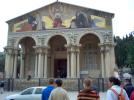
The visit to Jerusalem ended at Yad VaShem, monument and memorial of the Holocaust, a sinister and uncanny place for every person of whatever origin or religion. It was touching and impressive to see these young people hugging and holding each other as they silently marched through the new museum, as they stood shattered and silent in the children's hall or in front of Janos Korczak's memorial.
The next stop was Herzliah with an invitation to the Austrian Ambassador Dr. Kurt Hengl whose wife was relieved at the good manners of her young visitors. A real Viennese Jause was served to our delight, with Apfelstrudel, Sachertorte and delicious Palatschinken. The Austrian pupils presented the ambassador a drawing depicting Austrians efforts to weld Arabs and Palestinians together.
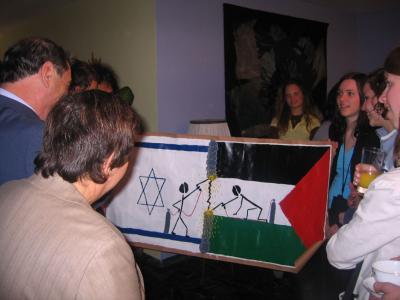
The following days were marked by the amazing generosity and hospitality common to all groups and people in Israel: The families of Kalanswa invited all the kids in their houses for a day and a night, where they were hosted in mixed groups of three to five by the families of the Arab participants.

After dinner, the kids decided on their own to spend part of the evening as a whole group and met all together in the house of Allaa, one of the Arab girls. During this time, the adult team was invited for an abundant dinner at the house of the school's principal, Mr. Nihad Zmiro and his wife Nazarin, to which other personalities of the Israeli-Arab world were invited, and where an interesting conversation on important political issues developed. On the next day we were all invited to the headquarters of the Arab Democratic Party in Nazareth, whose male as well as female, religious as well as secular, Arab as well as Jewish members have opted to follow Prime Minister Sharon's new political track and to give a chance to peace and coexistence with the Jews. After a meeting with the former parliament member and present chairman of the party, Mr. Abd Al-Wahab Daraushe and other party members, we visited the Annunciation Church, strolled through the Shuk (market), bought souvenirs and delicious baklava and finally headed for an overnight-stay at Ben's house in the magnificent blossoming and green Galilee at Harashim observatory. Ben's parents received us all - 35 youths and adults - to their house; a copious dinner and breakfast framed a night on mattresses and sleeping bags and pampered us generously until we left on the following day for our last stop in Israel, in a Kibbutz.
It was Eilam's mother who hosted us at Kibbutz Gaash, located at the Mediterranean near Natanya; a fabulous dinner, prepared as a joint venture by the mothers of three Jewish participants, was served to us in the garden near Eilam's house; a Kibbutz member of Austrian, in fact Carinthian origin, was there to relate to the Austrians' questions in perfect German; a walk to the seashore led us there just in time to watch a fabulous sunset, before a bonfire was lit to warm us on this last night before departure.
On the way, wherever we went, friendliness and generosity: Apart from free meals and lodge offered to us by parents of Jewish as well as Arab participants, road-vendors offered us free boxes full with strawberries and fruit when Otman went off the bus and told them who we were. It was as if the whole country with all its people had united to host and pamper us through the 8 days of our stay.
The last day of the peacecamp was dedicated to group-psychoanalytical workshops. This offered a good opportunity to discuss and elaborate on topics which had come up during the week, issues related to people's identity and (sometimes hurt) feelings, on the conflicts between people and generations and on questions which have ever since been the focus of interest of the young. This was the time to put emotions and feelings into words, to ask questions and to experience one's own, specific and unique being. Discussions dealt with the similarities and differences between groups and people, and with each person's own and individual perception of the world, a perception free of prejudice and preconception. They talked about love and affection, about learning from experience and asked questions that youth must ask and left unanswered until they can find their own, individual answers.
A tearful parting at Ben Gurion airport at 3 o'clock in the morning left many of the kids with broken, but full, hearts and with the feeling that something very meaningful has happened, something which would stay with them and which has really changed their vision of the world forever.
It was the second meeting of this group who had already spent ten days together in Austria last summer. There, they had come to know each other and had performed workshops dealing with the complexities of their respective personal and group-identities, had tried to cope together with various challenges and had experienced themselves as efficient problem-solvers and as multi-talented young artists.
This second encounter was meant to explore the multiple historic, cultural and religious roots of the ethnic groups involved even further and into more depth. A bus took us from the airport to the southern Negev desert, where we were guests of the Bedouins in Kseyfe, a recognized Bedouin village, and Um El-Hiran, an unrecognised Bedouin village. Sleeping in Bedouins' tents, sharing meals served with no cutlery in large bowls for five, sitting on the floor, participating in a political and culinary feast in a Bedouin village, a camel-ride through the blossoming desert were some of the highlights of the first two days and gave the group some insight into the way of life of the Bedouins, as well as into the problems they encounter in their attempts to find their place within the modern state of Israel to which they belong. A few centuries seem to separate these people from modern Israeli society - modest living conditions in aluminium huts partly without water and electricity and a way of life built on patriarchate, polygamy and the strict adherence to religious codes and rules.
Passing the Negev with its colourful stony mountains and craters, the fortress of Massada and the Dead Sea with a brief stop at the shore of Ein Gedi, we pursued our way up to Jerusalem, this fantastic modern city with its millennium-old history, its monuments and sites holy to all monotheistic religions. Having to put on a kippah (a kepi) when entering a Jewish site, having to take off your shoes before entering a mosque and knowing how to behave in a Christian church turned out to be a challenge for most of the adolescent, as well as adult, participants. Is it appropriate, is it allowed obeying the rules of another group's religious site, or would this betray your own set of beliefs and rules as dictated by your own faith and religion? And what if you unknowingly and unwillingly hurt somebody's feelings, because you simply do not know what is appropriate and what is wrong in the religious context of this other person?

The visit to Jerusalem ended at Yad VaShem, monument and memorial of the Holocaust, a sinister and uncanny place for every person of whatever origin or religion. It was touching and impressive to see these young people hugging and holding each other as they silently marched through the new museum, as they stood shattered and silent in the children's hall or in front of Janos Korczak's memorial.
The next stop was Herzliah with an invitation to the Austrian Ambassador Dr. Kurt Hengl whose wife was relieved at the good manners of her young visitors. A real Viennese Jause was served to our delight, with Apfelstrudel, Sachertorte and delicious Palatschinken. The Austrian pupils presented the ambassador a drawing depicting Austrians efforts to weld Arabs and Palestinians together.

The following days were marked by the amazing generosity and hospitality common to all groups and people in Israel: The families of Kalanswa invited all the kids in their houses for a day and a night, where they were hosted in mixed groups of three to five by the families of the Arab participants.

After dinner, the kids decided on their own to spend part of the evening as a whole group and met all together in the house of Allaa, one of the Arab girls. During this time, the adult team was invited for an abundant dinner at the house of the school's principal, Mr. Nihad Zmiro and his wife Nazarin, to which other personalities of the Israeli-Arab world were invited, and where an interesting conversation on important political issues developed. On the next day we were all invited to the headquarters of the Arab Democratic Party in Nazareth, whose male as well as female, religious as well as secular, Arab as well as Jewish members have opted to follow Prime Minister Sharon's new political track and to give a chance to peace and coexistence with the Jews. After a meeting with the former parliament member and present chairman of the party, Mr. Abd Al-Wahab Daraushe and other party members, we visited the Annunciation Church, strolled through the Shuk (market), bought souvenirs and delicious baklava and finally headed for an overnight-stay at Ben's house in the magnificent blossoming and green Galilee at Harashim observatory. Ben's parents received us all - 35 youths and adults - to their house; a copious dinner and breakfast framed a night on mattresses and sleeping bags and pampered us generously until we left on the following day for our last stop in Israel, in a Kibbutz.
It was Eilam's mother who hosted us at Kibbutz Gaash, located at the Mediterranean near Natanya; a fabulous dinner, prepared as a joint venture by the mothers of three Jewish participants, was served to us in the garden near Eilam's house; a Kibbutz member of Austrian, in fact Carinthian origin, was there to relate to the Austrians' questions in perfect German; a walk to the seashore led us there just in time to watch a fabulous sunset, before a bonfire was lit to warm us on this last night before departure.
On the way, wherever we went, friendliness and generosity: Apart from free meals and lodge offered to us by parents of Jewish as well as Arab participants, road-vendors offered us free boxes full with strawberries and fruit when Otman went off the bus and told them who we were. It was as if the whole country with all its people had united to host and pamper us through the 8 days of our stay.
The last day of the peacecamp was dedicated to group-psychoanalytical workshops. This offered a good opportunity to discuss and elaborate on topics which had come up during the week, issues related to people's identity and (sometimes hurt) feelings, on the conflicts between people and generations and on questions which have ever since been the focus of interest of the young. This was the time to put emotions and feelings into words, to ask questions and to experience one's own, specific and unique being. Discussions dealt with the similarities and differences between groups and people, and with each person's own and individual perception of the world, a perception free of prejudice and preconception. They talked about love and affection, about learning from experience and asked questions that youth must ask and left unanswered until they can find their own, individual answers.
A tearful parting at Ben Gurion airport at 3 o'clock in the morning left many of the kids with broken, but full, hearts and with the feeling that something very meaningful has happened, something which would stay with them and which has really changed their vision of the world forever.
(0 Kommentare) ... comment
Schedule April 2005: Spring-peacecamp 31.3.05-7.4.05
A search for our roots and identities: touring through Israel
A search for our roots and identities: touring through Israel
Identity-Peace Camp – April 2005 – Israel
Day 1 – Thursday 31.3.05 - Negev
16.05 – Arriving of the Austrian group to Israel.
17.30-18.00 – Traveling South to the Negev (desert).
20.00 – Mamshit – supper and a welcome gathering. (Sleeping in tents).
Day 2 – Friday 1.4.05 - Negev
07.00-08.00 – Breakfast and preparing for the day
08.00-12.00 – getting to know the Bedouins: 1. Visit in Alansar mosque.
2. Visit in a “recognized” Bedouin
Village.
3. Visit in an “unrecognized” Bedouin
Village. (coffee / tea).
4. Packed lunch.
13.00-15.00 – Navigation Gvanim River
15.30-17.30 – Ben Gurion Grave.
Havat Naot
18.00 – Mamshit – Bedouin hospitality & meal.
Team meeting.
Day 3 – Saturday 2.4.05 - Jerusalem
08.30 – 09.30 breakfast + packing
10.30 – 11.30 –The Great Crater.
12.00-14.30 – Navigating Zin river (or another river).
15.00 - 18.00–Camerun + swimming in the Dead Sea (Kalia Beach).
18.00 –Jerusalem
20.00 – arriving at the youth hostel.
Team meeting.
Day 4 – Sunday 3.4.05 - Jerusalem
08.00-09.00 – Breakfast
Panoramic view from Mt. Scopus and the Mt. of Olives
The garden of Gethsemane
The Kings' tombs at the Kidron Valley
The Wailing Wall and the Jewish Quarter
Archeology Garden
The Dome of the Rock
Christian Quarter –the tomb of Christ
Lunch
Roof tour
Mt. Zion – King David’s tomb / Last Supper room - discussion
19.00 - Supper (Youth hostel).
21.00-23.00 - A meeting with Austrian Holocaust survivors. (Managed by the Austrian Embassy).
Team meeting.
Day 5 – Monday – 4.4.05 – Jerusalem / Tel Aviv
08.00-09.00 – Breakfast
09.30 –14.00 – Yad Vashem – discussion
14.00-16.00 – Reception in the Foreign Ministry
18.00 – arriving to Emek-Hefer. Separating to the Arab families for the night.
Team meeting
Day 6 – Tuesday 5.4.05 - Kalanswa
13.30 – Meeting with Arab Parliament member – Mr. Dehamshe in Nazzreth.
Visit in Osfiye – A Moslem/Christian/Druses village
Charashim settlement in the Galilee
Sleeping at Charachim+ supper
Team meeting
Day 7 – Wednesday 6.4.05 - Kalanswa
09.00 – arriving to Kalanswa Community Center for the Analytical Sessions.
All day - 3 Analytical Sessions: 1.5 hours each
09.30-11.00 – first session.
11.00-11.30- a break
11.30-13.00 – second session.
13.00-14.30 – a lunch break
14.30-16.00 – third session
16.00- free time
Last day party
Sleeping together on the Mediterranean beach in Kibutz Gaash. (Sleeping bags)
Day 8 – Thursday – 7.4.05
Breakfast
06.10 – Austrian group’s departure.
The Team:
Susanne Shaked – Austria: President of Hadassah Austria
Nili Gross – Israel: Project’s Initiator and Manager / leader of the Jewish-Israeli group / Manager & Coordinator of the project’s program / Coordinator of the Artistic program.
Evelyn Boehmer-Laufer – Austria: Project’s Initiator and manager / Coordinator of psychoanalytic group-work and teamwork
Elfi Kopeinig- Austria: Leader of the Austrian group.
Heidi Jausovec - Austria: Co-leader of the Austrian group
Otman Hatib – Israel: Leader of the Palestinian-Israeli group
Husnia Matani – Israel: Co-leader of the Palestinian-Israeli group.
Ehud Gilboa - Israel: Leader of the Analytical sessions.
Michael Turkenich– Guide
Day 1 – Thursday 31.3.05 - Negev
16.05 – Arriving of the Austrian group to Israel.
17.30-18.00 – Traveling South to the Negev (desert).
20.00 – Mamshit – supper and a welcome gathering. (Sleeping in tents).
Day 2 – Friday 1.4.05 - Negev
07.00-08.00 – Breakfast and preparing for the day
08.00-12.00 – getting to know the Bedouins: 1. Visit in Alansar mosque.
2. Visit in a “recognized” Bedouin
Village.
3. Visit in an “unrecognized” Bedouin
Village. (coffee / tea).
4. Packed lunch.
13.00-15.00 – Navigation Gvanim River
15.30-17.30 – Ben Gurion Grave.
Havat Naot
18.00 – Mamshit – Bedouin hospitality & meal.
Team meeting.
Day 3 – Saturday 2.4.05 - Jerusalem
08.30 – 09.30 breakfast + packing
10.30 – 11.30 –The Great Crater.
12.00-14.30 – Navigating Zin river (or another river).
15.00 - 18.00–Camerun + swimming in the Dead Sea (Kalia Beach).
18.00 –Jerusalem
20.00 – arriving at the youth hostel.
Team meeting.
Day 4 – Sunday 3.4.05 - Jerusalem
08.00-09.00 – Breakfast
Panoramic view from Mt. Scopus and the Mt. of Olives
The garden of Gethsemane
The Kings' tombs at the Kidron Valley
The Wailing Wall and the Jewish Quarter
Archeology Garden
The Dome of the Rock
Christian Quarter –the tomb of Christ
Lunch
Roof tour
Mt. Zion – King David’s tomb / Last Supper room - discussion
19.00 - Supper (Youth hostel).
21.00-23.00 - A meeting with Austrian Holocaust survivors. (Managed by the Austrian Embassy).
Team meeting.
Day 5 – Monday – 4.4.05 – Jerusalem / Tel Aviv
08.00-09.00 – Breakfast
09.30 –14.00 – Yad Vashem – discussion
14.00-16.00 – Reception in the Foreign Ministry
18.00 – arriving to Emek-Hefer. Separating to the Arab families for the night.
Team meeting
Day 6 – Tuesday 5.4.05 - Kalanswa
13.30 – Meeting with Arab Parliament member – Mr. Dehamshe in Nazzreth.
Visit in Osfiye – A Moslem/Christian/Druses village
Charashim settlement in the Galilee
Sleeping at Charachim+ supper
Team meeting
Day 7 – Wednesday 6.4.05 - Kalanswa
09.00 – arriving to Kalanswa Community Center for the Analytical Sessions.
All day - 3 Analytical Sessions: 1.5 hours each
09.30-11.00 – first session.
11.00-11.30- a break
11.30-13.00 – second session.
13.00-14.30 – a lunch break
14.30-16.00 – third session
16.00- free time
Last day party
Sleeping together on the Mediterranean beach in Kibutz Gaash. (Sleeping bags)
Day 8 – Thursday – 7.4.05
Breakfast
06.10 – Austrian group’s departure.
The Team:
Susanne Shaked – Austria: President of Hadassah Austria
Nili Gross – Israel: Project’s Initiator and Manager / leader of the Jewish-Israeli group / Manager & Coordinator of the project’s program / Coordinator of the Artistic program.
Evelyn Boehmer-Laufer – Austria: Project’s Initiator and manager / Coordinator of psychoanalytic group-work and teamwork
Elfi Kopeinig- Austria: Leader of the Austrian group.
Heidi Jausovec - Austria: Co-leader of the Austrian group
Otman Hatib – Israel: Leader of the Palestinian-Israeli group
Husnia Matani – Israel: Co-leader of the Palestinian-Israeli group.
Ehud Gilboa - Israel: Leader of the Analytical sessions.
Michael Turkenich– Guide
(9 Kommentare) ... comment